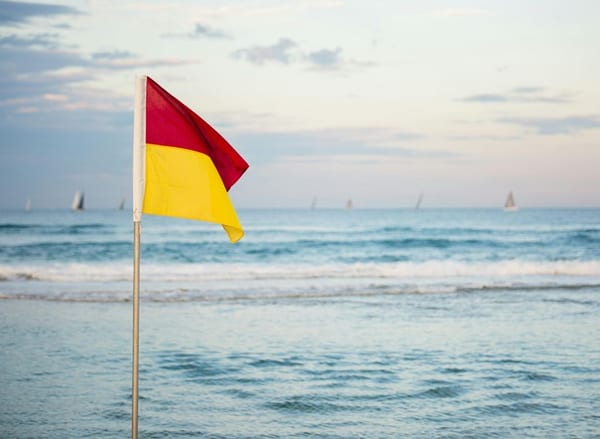Beach Safety
The beaches in Lincolnshire are fantastic places, but there can be hidden dangers.

Stay safe on the Lincolnshire Coast
The beaches in Lincolnshire are fantastic places to enjoy some natural relaxation, but there can also be hidden dangers. With its stunning beaches and inviting waters, it's essential to be aware of potential risks and take necessary precautions. Visitors to Lincolnshire's beaches should follow the guidance of the RNLI and be aware of beach safety signs advising of hazards. Here you will find important advice and guidance to help you enjoy our beaches to the fullest while staying here.

Visit a Lifeguarded beach
When visiting the Lincolnshire Coast to swim or paddle in the sea, please visit a lifeguarded beach. A lifeguarded beach is a section of the coast that is patrolled by the RNLI. These beaches have trained professionals on duty who can assist in case of emergencies. Please note that not every beach on the coast is patrolled by lifeguards.
In Lincolnshire, there are 3 RNLI lifeguarded beaches - Mablethorpe Beach, Skegness Beach, and Sutton-on-Sea Beach. These beaches are patrolled during the peak season which typically falls between May and September (some beaches may vary depending on visitor numbers). During the summer, the beaches are patrolled from 10 am to 6 pm. This information may change so do check the RNLI website for more information on patrol times during the summer.

Get to know your flags
When on a lifeguarded beach, find the red and yellow flags. The flags indicate that this section of the beach is patrolled by a qualified lifeguard and show you where it is safe to swim. If you intend to swim, bodyboard or be in the water in any way, do so between the red and yellow flags. If there are no flags at the beach, avoid entering the water. If the red flag is flying, the water is dangerous, and you should not enter under any circumstances.
Beach Safety
- It is recommended to always swim with a partner, and never swim alone without close supervision.
- If you see someone in difficulty, do not attempt a rescue. Alert the lifeguard or call 999 and ask for the coastguard.
- Before entering the water, assess your swimming ability. Do not swim in the sea if you are not a strong swimmer. The conditions in the water are far more unpredictable than in a pool.
- Supervise children closely when near or in the water, and ensure they wear appropriate flotation devices if needed.
Sun Safety & Hydration
- Lincolnshire's beaches can be sunny and exposed, so it's important to protect your skin from UV rays. Apply sunscreen with a high SPF before heading to the beach, and reapply regularly, especially after swimming.
- Wear protective clothing such as hats and sunglasses to protect yourself from the sun's rays.
- Over-exposure can be dangerous, do not spend too long in the sun and seek shade when the sun is at its strongest.
- Spending time outdoors in the sun can lead to dehydration, so be sure to drink plenty of water throughout the day. Pack a reusable water bottle and refill it as needed.
Respect Lincolnshire's natural environment
- Respect beach rules and regulations, including any restrictions on activities such as barbecues, alcohol consumption, or bringing pets.
- Dispose of litter responsibly by using designated bins or taking it with you when you leave. Help keep Lincolnshire's beaches clean and beautiful for everyone to enjoy.
Find out more about Beach Safety
By following these beach safety guidelines, you can have an enjoyable experience on the Lincolnshire Coast. The RNLI website is a wealth of advice and guidance on how to get the most out of your visit to the beach and stay safe. For more information, visit the RNLI website.